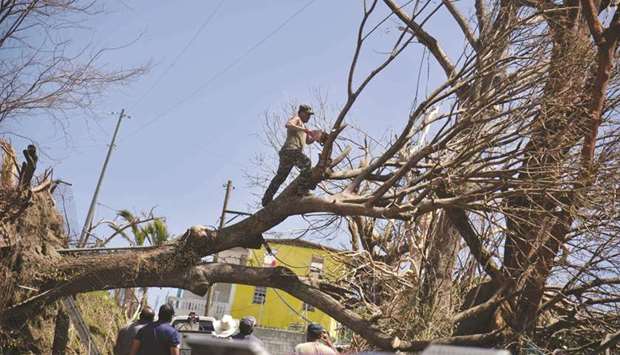The mayor of the capital of Puerto Rico hit back yesterday at the comments of a top US official who said federal efforts to help the territory recover from the devastation of Hurricane Maria is “a good news story”.
“This is not a good news story,” Carmen Yulin Cruz told CNN yesterday. “This is a ‘people are dying story.’ This is a life-or-death story.”
Acting Department of Homeland Security Secretary Elaine Duke, who is helping co-ordinate US help after Maria, said on Thursday that she was satisfied with the response so far.
“I know it is really a good news story in terms of our ability to reach people and the limited number of deaths that have taken place in such a devastating hurricane,” Duke said.
Maria, the most powerful storm to hit Puerto Rico in nearly 90 years, has killed at least 16 people on the island and more than 30 across the Caribbean.
As most of the island’s 3.4mn residents faced a 10th day without power and struggled to find clean water and fuel, Cruz bristled at Duke’s comment.
“This is a story of a devastation that continues to worsen because people are not getting food and water,” Cruz said on CNN. “It is not good news when people are dying.”
Duke arrived in Puerto Rico yesterday for a previously scheduled trip, joining Governor Ricardo Rossello for an aerial tour of the island.
US President Donald Trump was scheduled to go Puerto Rico on Tuesday, while Vice-President Mike Pence will be in Puerto Rico and the US Virgin Islands late next week, an aide said.
Trump addressed the situation yesterday before a speech in Washington about his new tax plan.
“The electrical grid and other infrastructure were already in very, very poor shape. They were at their life’s end prior to the hurricanes,” said Trump. “And now virtually everything has been wiped out, and we will have to really start all over again. We’re literally starting from scratch.”
Colonel James DeLapp, the Army Corps of Engineers commander for Puerto Rico, told CNN earlier yesterday that repairing Maria’s widespread destruction was a massive undertaking.
“The closest thing we’ve had is when the Army Corps led the effort to restore Iraq’s electricity in the early stages of the Iraq war in 2003 and 2004,” he said.
Financing the rebuilding of the island is set to be complicated after Puerto Rico filed the largest-ever US local government bankruptcy in May, weighed down by $72bn in debt.
“Ultimately the government of Puerto Rico will have to work with us to determine how this massive rebuilding effort, which will end up being one of the biggest ever, will be funded and organised, and what we will do with the tremendous amount of existing debt already on the island,” said Trump.
Life in Puerto Rico remains tough.
In Old San Juan, the capital’s historic colonial section, customers lined up on the sidewalk outside Casa Cortez ChocoBar cafe to get sandwiches and coffee from a small window between plywood planks clinging to the building wall.
“We’re one of the few restaurants that have a generator,” said Daniela Santini, 19, who works there. “Most businesses don’t have electricity, only some have water. We’re one of the lucky ones.”
More troops, medical supplies and vehicles were on the way to the island, but it will be some time before the US territory is back on its feet, the senior US general appointed to lead military relief operations said.
“We’re certainly bringing in more,” Lieutenant General Jeffrey Buchanan told CNN yesterday, a day after he was appointed by the Pentagon to oversee the US response.
Air Force, Navy and Army medical capabilities as well as more aircraft, helicopters of different types, and more logistical support are being dispatched, he said.
“It’s not enough, but we’re bringing more in,” Buchanan said.
Meanwhile, insurers and reinsurers were counting the cost of Maria, with one modelling firm estimating that claims could total as much as $85bn.
Adding in other storms and earthquakes, this year could be the costliest on record for the industry and tip some insurers and reinsurers into the red.
Trump has defended his administration’s handling of the disaster.
“Puerto Rico Governor Ricardo Rossello just stated: ‘The Administration and the President, every time we’ve spoken, they’ve delivered...’,” Trump tweeted early yesterday.
Rossello told CNN yesterday that the federal government has responded to his requests and that he was in regular contact with the director of the Federal Emergency Management Agency (FEMA), but more needed to be done.
“We are maximising all of the resources that we have so that we can deliver goods, water food and supplies,” he said. “We do have severe logistical limitations. It has been enhancing but it’s still nowhere near where it needs to be.”
The mayor of San Germ?n, a city of about 35,000 in the southwest corner of the island, challenged Rossello’s assessment on Twitter.
“The governor is giving a message that everything is resolved and it is not true,” he said in a tweet in Spanish. “There is no functional operational structure. We are alone.”
In San Juan, Mayor Cruz asked for more immediate action.
“Mr Trump, we appreciate everything you’re doing, and we know it can be done faster,” she said on CNN. “Let’s just put a crew out there with enough equipment and let’s just push things out of the way and move.”
Asked how long it would take for Puerto Rico to recover, Buchanan, the general leading the military effort, gave a slight sigh and said: “This is a very, very long duration.”

san jua
